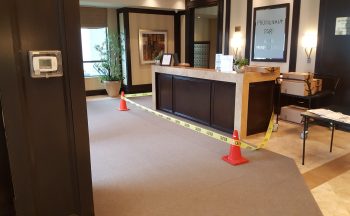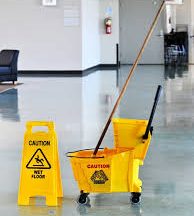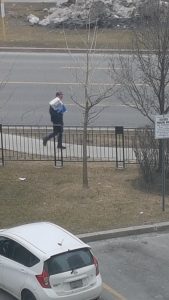 June 2020
June 2020
The times they are a changin’.

As the threat from covid subsides life, and condo living, has changed.
Our view of essential services never included government offices, cannabis, alcohol, legal or online services. It is supermarkets and their distribution systems that we rely on. We require health care practitioners, contractors who help maintain our homes, growers of food, and manufacturers of food and equipment. These truly essential services were delivered when we needed them most.
Survival during quarantine and self-isolation would not have been possible without their efforts.
In the world we now live in banks have closed branches; many of which may never reopen. The same applies to businesses of all types. Employment will be harder to obtain as jobs from closed businesses are not replaced. Job loss will occur as companies speed up automation of roles previously filled by people such as cashiers, bank tellers, inventory counters and sales staff. After all, automation does not get infected by virus and not show up for work. It doesn’t require benefits. Automation can do the same work faster and at lower cost.
Historical Perspective on Pandemics
How bad is covid-19? Pandemics are a periodic occurrence in our history. The Great Influenza Pandemic of 1918/19 resulted in the death of up to 30 percent of the world population. No vaccine has yet to be found and the flu recurs each year. Covid-19 is estimated to cause the death of about the same number of people as malaria does each year (more than 400,000), and far less than those impacted by tuberculosis annually (1.4 million). Polio and smallpox, pandemics many alive today lived through, were dramatically more devastating.
Covid Numbers and Impact in Canada
Each year an estimated 112,200 are hospitalized in Canada from the flu, and about 3,500 die. During the 1968 flu pandemic (Hong Kong Flu) there were about 4,000 deaths. (source: The Canadian Encyclopedia) No general isolation measures were implemented.
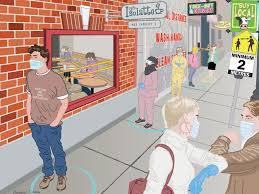 It appears that fewer than 0.1 percent of Canadians tested positive for covid-19 and of those 4.5 percent died. About half were nursing home patients. Globally 96 percent of those infected experience mild symptoms. Some believe that measures taken were slow to be implemented, poorly considered, overly broad and difficult to justify except as an excessive reaction to fear. Brad Lamb, real estate developer, has published a well-written, concise and widely-distributed view of these costs. Click here to read the letter.
It appears that fewer than 0.1 percent of Canadians tested positive for covid-19 and of those 4.5 percent died. About half were nursing home patients. Globally 96 percent of those infected experience mild symptoms. Some believe that measures taken were slow to be implemented, poorly considered, overly broad and difficult to justify except as an excessive reaction to fear. Brad Lamb, real estate developer, has published a well-written, concise and widely-distributed view of these costs. Click here to read the letter.
In the coming years we will likely see dramatic reductions in government services and benefits, and increased taxes as we struggle with recovery.
Impact on High-Rise Communities
As our world changes high-rise communities will need to adapt. More will work from home. Many more will be unable to find work and remain at leisure. There will be greater pressure on offering and maintaining common areas that will be more heavily used. More are likely to have difficulty paying condo fees.
Much of this is uncharted territory making it difficult to know how communities can or should respond. Certain things have become clearer.
Cleanliness
Communities neglecting cleanliness do so at their peril. Our first line of defense is cleaning contractors. Committing more toward cleaning services and supplies is likely to be more acceptable in the post-covid world.
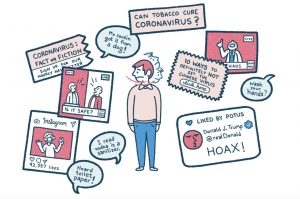 Our communities and society need to commit more resources to maintaining cleanliness. Don Tapscott, co-author of 16 books, Adjunct Professor at INSEAD, Chancellor Emeritus of Trent University, and ranked by Thinkers50 as the #2 most influential living business thinker states “Personal hygiene and sanitation is top of mind and that should last. We’ve all become hyperaware of germs, airborne or otherwise. Those of us who played fast and loose with bars of soap have become handwashing fanatics. Forget about kissing the cheeks of friends or shaking the hands of colleagues as greetings; a demonstrative nod of the head or a crisp bow from the waist will do! So, at that first post-corona virus conference, will you resume physical contact with strangers?”
Our communities and society need to commit more resources to maintaining cleanliness. Don Tapscott, co-author of 16 books, Adjunct Professor at INSEAD, Chancellor Emeritus of Trent University, and ranked by Thinkers50 as the #2 most influential living business thinker states “Personal hygiene and sanitation is top of mind and that should last. We’ve all become hyperaware of germs, airborne or otherwise. Those of us who played fast and loose with bars of soap have become handwashing fanatics. Forget about kissing the cheeks of friends or shaking the hands of colleagues as greetings; a demonstrative nod of the head or a crisp bow from the waist will do! So, at that first post-corona virus conference, will you resume physical contact with strangers?”
Cleanliness should not be limited to visible interior areas. High-rise communities need to ensure trash chutes are maintained with chute doors closing after use. Chutes and dumpsters require regular cleaning. Bags of trash should never be left on floors in chute or waste rooms. Overflowing dumpsters should no longer be acceptable.
- More frequent cleaning of touch points; areas in common areas most frequently handled or touched. In the most public areas this includes door handles, elevator buttons, light switches, door opening buttons and push plates, buzzer systems, and hand rails. Other spaces include washroom toilets, faucets and sinks, and exercise equipment. Daily cleaning, considered adequate by many, now seems insufficient. For exercise and work/study areas accessible cleaning supplies for resident use may become more common.
- Odours from chutes and waste areas are a potential sign of trouble. Unaddressed these odours eventually enter residential hallways and other areas. Dealing with symptoms of a problem, odours, is faster but less desirable than addressing its source.
- Cleaning supplies that smell good and avoiding products because someone has an allergy should be unacceptable unless alternatives are equally effective. Risking the health of a community by using cleaners that smell good or are less effective suggests misplaced priorities.
- Mailrooms require more attention. Mailboxes should be cleaned and disinfected along with touch points. Paper, including flyers and magazines, when allowed in these areas facilitate transmission of infectious viruses.
- Pet waste should never be allowed on indoor or outdoor common areas. Services available for minimizing pet waste include regular area cleanups, provision of waste bags and receptacles, and pet dna services.
Condo Board Authority, Communications and Meetings
Looking back, our governments only provided us with part of the story. While telling all of us what we needed to do during the coronavirus pandemic, their credibility would have been stronger had they acknowledged their failure. They allowed coronavirus to migrate faster by failing to close off travel from infected regions. Their late response devastated our economy and livelihoods. Tax implications are likely to be staggering. Yet it is unclear if a better approach could have been taken.
Our politicians treated us as if we were children. They patronized us while trying to figure things out and presented theories as fact. Death rate projections, believed by many, were so wildly inflated they now appear to have been based on theories which should have been questioned.
 In many ways this approach is similar to how some condo governments have operated. Some appear to have overstepped their legal authority while failing to communicate effectively.
In many ways this approach is similar to how some condo governments have operated. Some appear to have overstepped their legal authority while failing to communicate effectively.
Meetings and elections were unnecessarily postponed. Technology for conducting electronic meetings and voting, readily available and easily used, seems to never have been considered. Boards unwilling to accept and adapt to change have likely failed in other areas more easily hidden from owners.
Corporations that chose to screen visitors did so without government directive and without authority. Condo boards and managers assumed the role of health provider by questioning visitors about their current health or recent travels, or by asking residents to inform them of their current health. Such actions constitute a willful ignorance or unwillingness to comply with the limits on condo board authority.
It was unnecessary for communities to send out daily communications repeating what was known from other sources. Supplementing electronic distribution with paper delivered door-to-door was wasteful and a further potential source of infection. Many communities were unprepared to communicate electronically using condo management software. Others, having the technology in place, felt it was insufficient. It seems that some condo boards and management remain mistrustful of these technologies.
Physical distancing was of limited value. It was successful in slowing down the spread of covid-19 which was its primary purpose so health services could be maintained as demands increased. It was a failure in that many purposefully ignored physical distancing. Lines in Costco and supermarkets were longer than ever. School closures meant more play dates. In the absence of government directive, communities lack authority to enforce physical distancing protocols. Many that sought to enforce these protocols imposed a double standard. Residents were asked to maintain precautions, denied the right to bring in contractors and visitors, and common areas were closed while building maintenance, landscaping and equipment testing were deemed acceptable.
Condo Fee Collections
The business of residential condominium management must continue. Without continued inflow of condo fees there can be insufficient funds to maintain cleanliness, keep elevators operational and maintain staffing. Condo fees should continue to be paid in full regardless of other factors.
When collections become problematic, legal costs can be mitigated by approaching mortgage holders. Mortgage holders are unlikely to risk loss of their asset because of a mortgagee’s failure to pay condo fees. Financial institutions likely have agreements in place allowing them to pay these fees and add to an outstanding mortgage. Directly approaching a mortgage holder saves legal fees being incurred.
Package Deliveries
As the covid pandemic unfolded package receiving has been recognized as an essential service. For many deliveries were the only way to obtain food, medication and other necessities. Unwisely, some communities sought to prohibit or restrict deliveries. Communities with automated parcel lockers were best prepared with an exceptional combination of service, safety and efficiency. Communities relying on condo management software to manage packages were able to maintain operations while struggling with higher package volumes and maintaining physical distancing protocols.
Amenities
One reason for high-rise communities to have amenities is compensation for inadequate in-suite living space. Closure of amenities by board or management decree, and absent government directive or maintenance consideration, may be improper particularly when other options are available.
Condo boards attempting to confine residents in this way was counterproductive in that some feel greater need to escape the confines of their small living space in contravention of isolation protocols.
In practice, isolation protocols such as physical distancing can be maintained in some amenities including exercise rooms, lounges and work/study areas.
Working from Home
According to Don Tapscott “Working from home really works for those of us in white collar jobs with privacy, high speed connectivity, and space for all the necessary equipment. It saves a lot of commuting time and may reduce our carbon footprint.”
More are recognizing the value of working from home. High-rise communities attractive to such individuals offer common area space conducive to this type of work
Should working from home remain popular, it may not be long before today’s high-rise office towers become tomorrow’s high-rise residential homes.
Find Vendors in these Related Categories
- Accessibility Products
- Accounting
- Cleaning & Janitorial Services
- Cleaning Services - Carpets
- Cleaning Services - Ducts
- Cleaning Services - Windows
- Condo Communications
- Condo Management
- Condo Software - Management Software, Electronic Voting and more
- Education & Recreation
- Financial Services
- Financial Services - Investments
- Financial Services - Loans
- Financial Services - Mortgages
- Home Office
- Home Services & Automation
- Landscaping and Gardening Services
- Meeting Minutes
- Parcel Management Solutions
- Parking Management/Cleaning Services
- Pressure Washing
- Recreation and Fitness
- Security Services and Technologies
- Waste Services




